Author: Zeng Lu
On July 17th, Russia announced the suspension of the Black Sea Grain Initiative. During the Russia-Africa Summit in late July, African countries responded to the announcement. How will the Black Sea Grain Initiative progress in the future?
Total words2224About5minutes
The Russia-Ukraine conflict erupted in February 2022 has triggered a chain reaction worldwide. Ukraine is a major global food producer. In 2021, Ukraine provided food for approximately 400 million people worldwide. Ukrainian and Russian wheat exports accounted for 30% of the global total export before the war. The Russia-Ukraine conflict has led to a sharp decline in food production and exports in the region. A United Nations (UN) report indicates that the COVID-19 pandemic has caused a significant increase in global food prices. The Russia - Ukraine conflict has driven up energy prices, resulting in a substantial increase in fertilizer prices and further pushing up food prices. Additionally, Russia's control of Black Sea ports has prevented Ukraine from exporting food, disrupting global commodity markets and trade, and exacerbating the global rise in food prices.
Black Sea Grains Initiative Resumes Ukrainian Grain Exports
In April 2022, UN Secretary-General Guterres proposed the Black Sea Grain Initiative after meeting with Russian President Vladimir Putin and Ukrainian President Volodymyr Zelensky. The initiative aims to restore Ukrainian exports of grain, other food and fertilizers via the Black Sea during the Russia-Ukraine war to support stability in global food price and prevent millions from falling into famine.
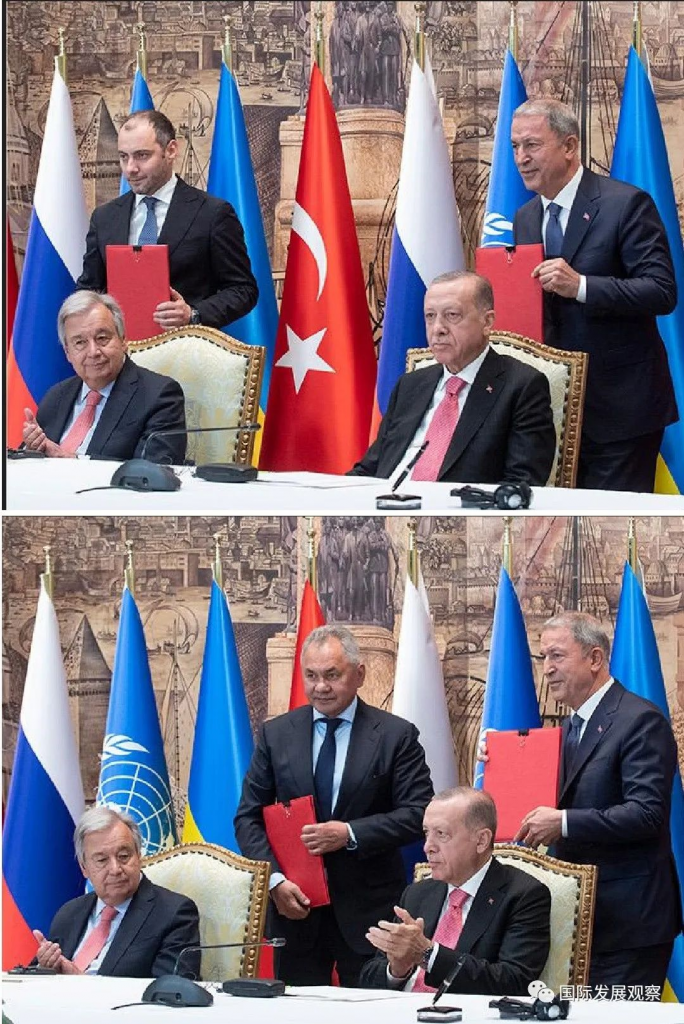
(UN/Image)
Under the mediation of the United Nations and Turkey, the signing ceremony of the "Initiative on the Safe Transportation of Grain and Foodstuffs from Ukrainian ports" took place in Istanbul in July 2022, which allowed Ukraine to export grains and agricultural products through Black Sea ports. Reciprocally, the United Nations separately signed a memorandum of understanding with Russia, pledging to facilitate the unimpeded return of Russian grain and fertilizer products to the global market.
The Black Sea Grain Initiative proposed to establish a maritime humanitarian shipping corridor, allowing the export of Ukrainian grain and fertilizer from three key Black Sea ports (Odessa, Chornomorsk, and Yuzhne-Mykolaiv). Ukrainian vessels guide cargo ships into international waters of the Black Sea to avoid mined areas, which then follow a pre-determined maritime humanitarian corridor to Istanbul. The Joint Coordination Center (JCC), composed of representatives from the United Nations, Russia, Turkey, and Ukraine, is responsible for overseeing the implementation of the Black Sea Grain Initiative and inspecting vessels traveling to and from Ukrainian ports. The Joint Coordination Center is located in Istanbul, with the United Nations serving as the secretariat.
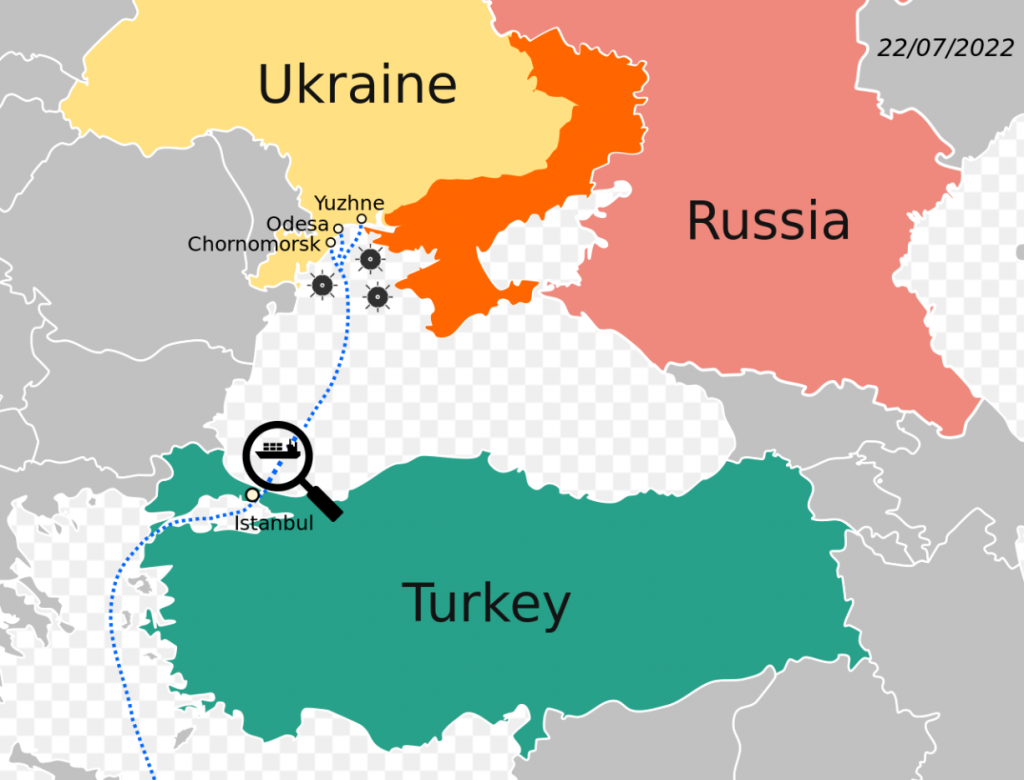
(Wikipedia/Graph)
Black Sea Grains Initiative Mitigates Food Security Challenges
Since its entry into force, the Black Sea Grain Initiative has shipped some 32 million tons of Ukrainian grain to various parts of the world, including regions facing significant food security risks such as the Horn of Africa, the Sahel, Yemen and Afghanistan. The main grains exported under the Black Sea Grains Initiative are corn, wheat, sunflower oil, etc. The initiative contributes to reducing food prices in the world's poorest countries.
According to information from the Joint Coordination Center, the top three exporters of food and agricultural products under the Black Sea Grains Initiative are China, Spain and Turkey. 64% of grain was shipped to developing economies and 44% of wheat exports went to low- and middle-income countries, including those receiving World Food Program (WFP) assistance. 725,000 tons of food (approximately 2.2% of exports) traveled through humanitarian corridors used by the WFP as aid to countries such as Ethiopia, Somalia and Yemen. The Black Sea Grains Initiative is "a lifeline for 79 countries and 349 million people on the frontlines of food insecurity", according to the International Rescue Committee.
Which countries are the main destinations for grain exports under the Black Sea Grains Initiative?
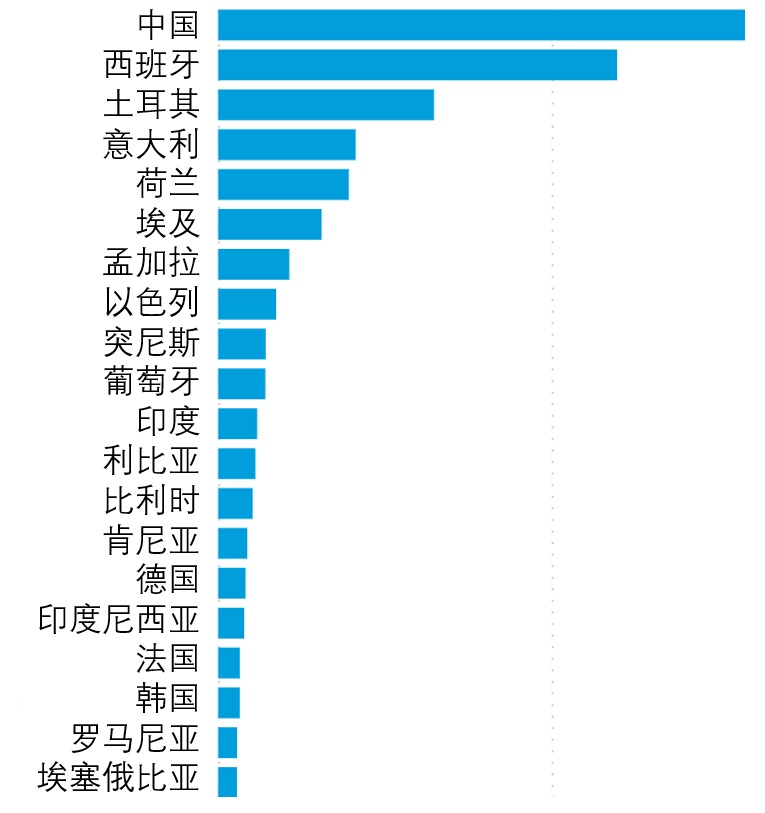
(UN/Image)
The Black Sea Grains Initiative plays a key role in supporting global food security. Many people in developing countries have been hit hard by high food prices. The initiative suspended Russia's blockade of major Ukrainian Black Sea ports, allowing Ukrainian food supplies to enter global markets, helping to reduce global food prices, stabilize global markets and alleviate the global food crisis. The Black Sea Grains Initiative provides a critical lifeline to impoverished countries in regions such as Africa and the Middle East. However, although food prices have come down from their record highs at the onset of the Russia-Ukraine conflict, they are still higher than they were before the crisis. In addition, currency depreciation prevented many developing countries from benefiting from lower global food prices, and food prices even increased in some countries.
Black Sea Grains Initiative Helps Rein in Food Prices
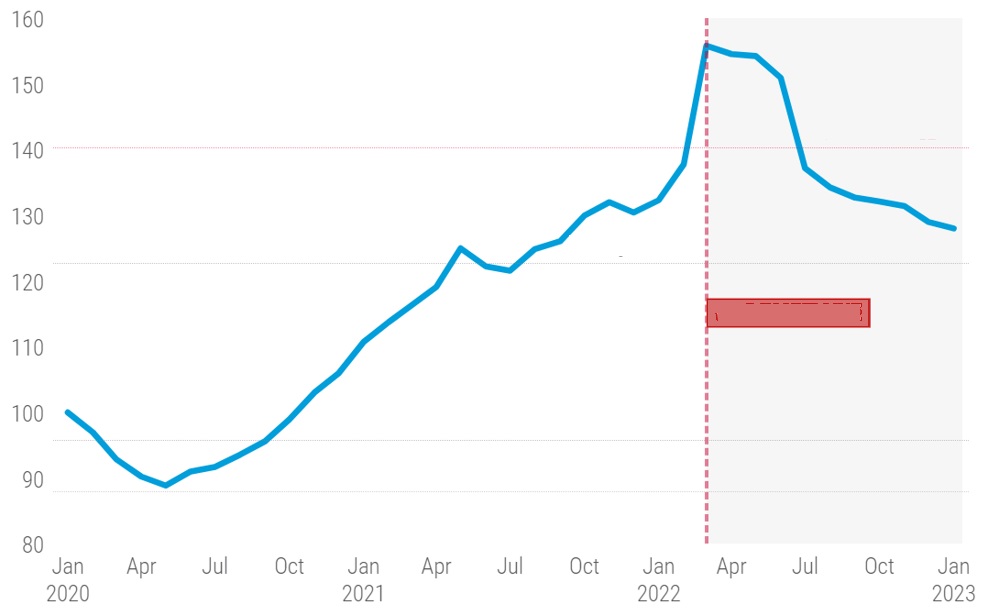
(UNCTAD/FAO/Figure)
China imports large amounts of grain under Black Sea Grains Initiative
In recent years, China's grain imports from Ukraine have continued to increase. Under the Black Sea Grains Initiative, China bought about 8 million tons of grain from Ukraine, accounting for about a quarter of the total grain exports unlocked under the initiative. China mainly imports corn and barley from Ukraine. Previously, China's barley imports from Ukraine increased from 1 million tons in 2020 to 2.8 million tons in 2021, accounting for more than two-thirds of China's total barley imports. In addition, 32% of Ukraine's corn exports were shipped to China, mainly for food, cooking oil and animal feed, accounting for 30% of China's total corn imports.
Black Sea Grains Initiative suspended as Russia withdraws
After the outbreak of the Russia-Ukraine conflict, Western countries did not impose sanctions on Russia's grain and fertilizer exports. Moscow believes that Western sanctions on Russia have caused restrictions on payment, logistics and insurance, and constituted an obstacle to the export of Russian agricultural products. Putin also said: Russia agreed to the Black Sea Grain Initiative to support African and Latin American countries. However, only about 3.2-3.4% of grain flows to the poorest countries in the world, while 40% of grain flows to prosperous countries.
From October 29 to November 2, 2022, the Black Sea Grains Initiative was temporarily suspended. The initiative has been extended several times until July 18, 2023. In June 2023, Russia announced that it was considering withdrawing from the Black Sea Grain Initiative due to obstacles to the export of Russian agricultural products. On July 17, 2023, Russia announced that it would not extend the deadline for the Black Sea Grains Initiative on the grounds that the United Nations had not fulfilled its commitments in the memorandum of understanding. The initiative expired on July 18.
From July 27 to 28 this year, the second Russia-Africa Summit was held in St. Petersburg, and food security became a key topic of the summit. Putin delivered a speech and said: Russia is ready to replace Ukraine's food exports to Africa through commercial and aid efforts to fulfill Moscow's key role in global food security. On July 28, African leaders said Moscow's support for safe exports of Ukrainian food during the conflict was crucial to Africa. "The interruption of energy and food supplies must stop immediately. The food deal must be extended in the interest of the peoples of the world, especially Africans," African Union Commission Chairperson Moussa Faki Mohamed said in St. Petersburg.

(Kremlin/RIA Novosti/Photo)
Uncertainty ahead for Black Sea Grains Initiative
The future development of the Black Sea Grains Initiative depends on many factors such as the Russian government's decision-making, the development of the Russia-Ukraine conflict and regional tensions, and the response and cooperation of the international community. The future of the Black Sea Grains Initiative is uncertain. Here are four possibilities for the future of the initiative.
Cargo Ship Flows Under the Black Sea Grain Initiative
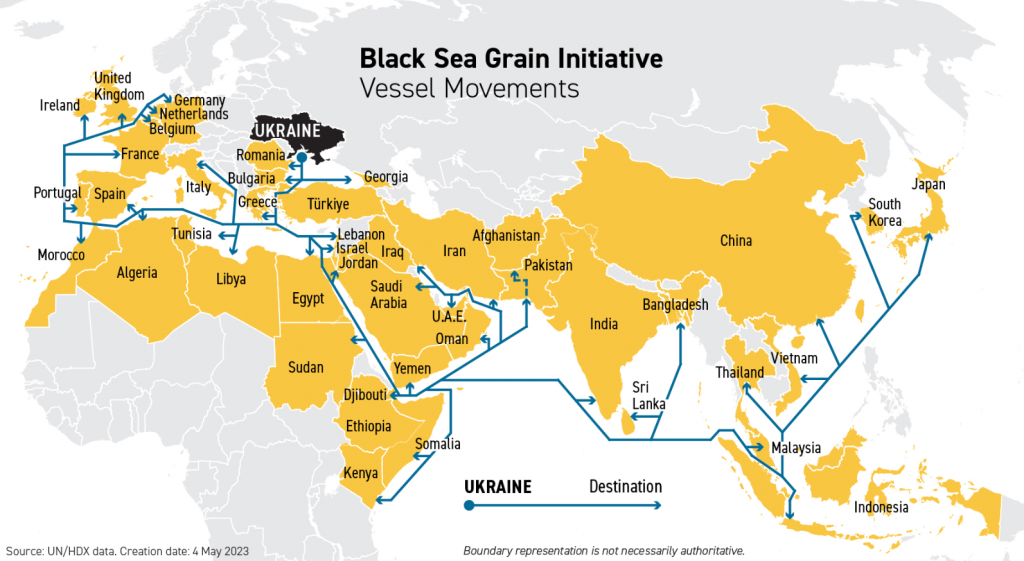
(State Dept./M. Gregory/Photo)
One is the continuation and expansion of the initiative.The Black Sea Grains Initiative may be continued and expanded if the Russian government reverses its decision to suspend the initiative and resumes negotiations. In this scenario Ukraine would be able to continue exporting food, supporting the stability of global food prices and preventing starvation for millions. The initiative will continue to feed the world's poorest countries.
Second, the initiative faces long-term suspension or termination.If the Russian government insists on its decision not to participate in the Black Sea Grain Initiative, the Black Sea Grain Initiative may face the risk of being suspended for a long time or even terminated. This would have a major impact on global food supply and prices, or lead to higher global food prices, increasing the risk of global famine. At the same time, it may also arouse the attention and protests of the international community and further aggravate regional tensions.
Third, the implementation of the initiative encountered difficulties.Even if the implementation of the Black Sea Grains Initiative resumes, the impact of war and regional tensions may once again make implementation of the initiative challenging. For example, Ukrainian grain exports could be affected by the conflict, disrupting food supplies. In addition, the Russian-Ukrainian conflict has entered a new stage, which may make it more difficult and dangerous for ships to sail on humanitarian passages at sea.The fourth is to initiate adjustments or trigger new international cooperation.The content and implementation of the Black Sea Grains Initiative may be adjusted according to the needs of all parties, or lead to new international cooperation to solve global food supply and price problems. For example, other countries could come up with similar initiatives, or a new grain trade relationship with Ukraine to bridge the food supply gap caused by Russia's withdrawal from the initiative.
References
https://news.un.org/zh/story/2023/01/1114327
https://www.un.org/en/black-sea-grain-initiative/data
https://www.un.org/en/black-sea-grain-initiative/vessel-movements
https://www.un.org/en/black-sea-grain-initiative/data
https://www.aljazeera.com/news/2023/7/17/russia-ukraine-black-sea-grain-deal-all-you-need-to-know

All rights reserved, please indicate the source when citing.
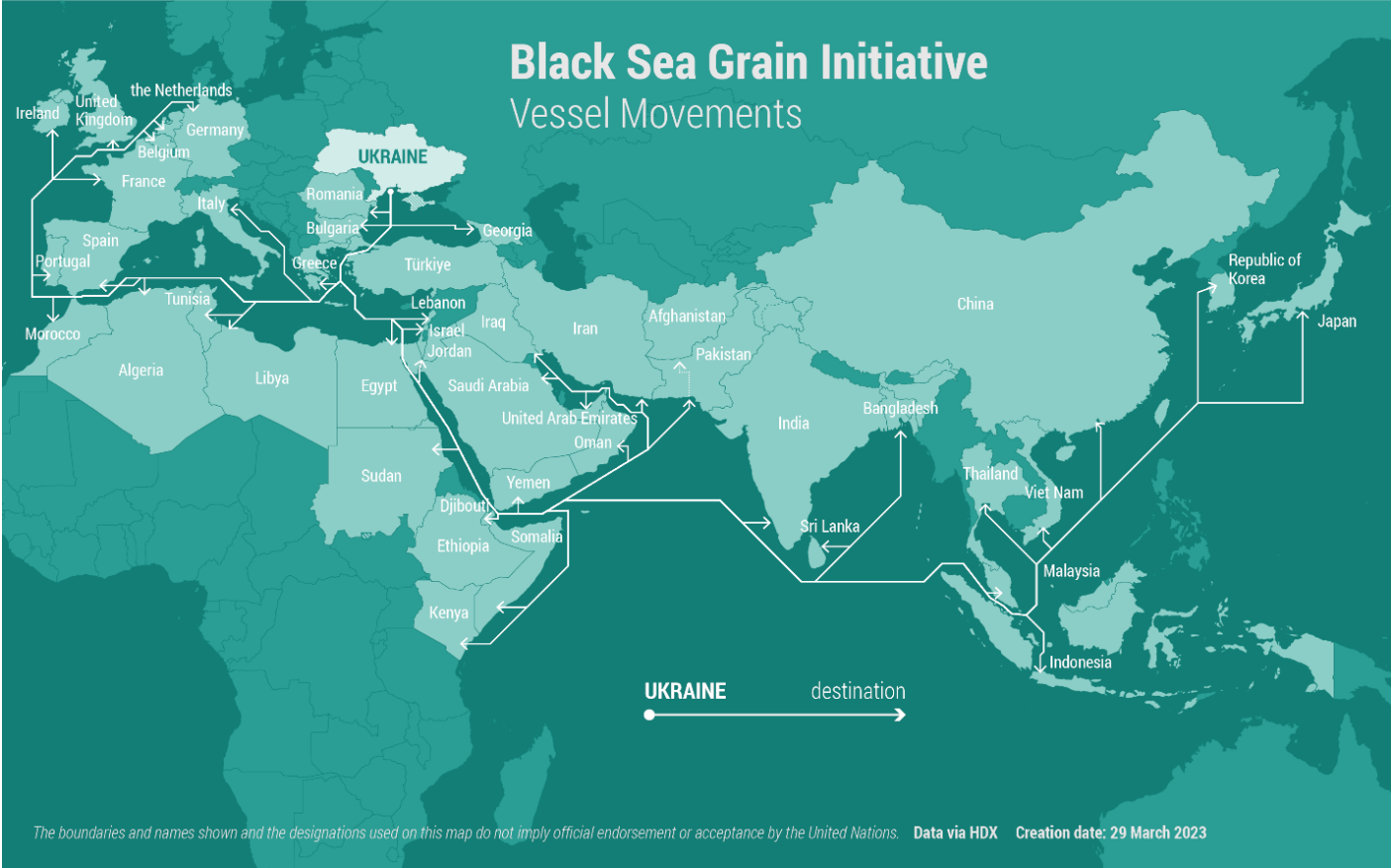
Comment (2)
Blondell| October 22, 2023
Inspiring quest there. What happened after? Take care!
avenue17| November 18, 2023
Bravo, very good idea